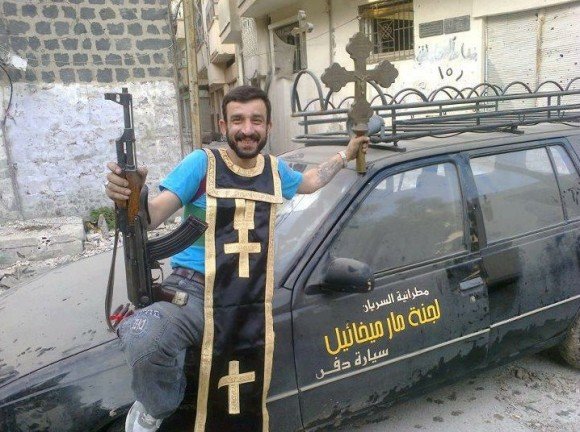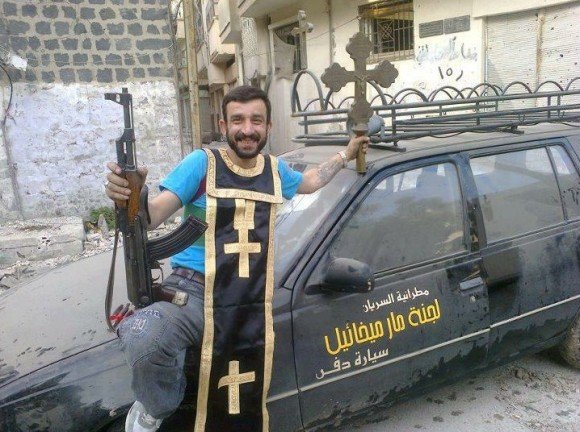Outgoing artillery shook St Elias church as the priest reached the end of the Lord’s Prayer.
The small congregation kept their eyes on the pulpit, kneeling when required and trying to ignore the regular thuds that rattled the stained glass windows above them.
Home to one of the oldest Christian communities in the world, the hard to reach Syrian agricultural town of Izraa has stood the comings and goings of many empires over the centuries.
But as the country’s civil war creeps closer, it is threatening to force the town’s Christians into permanent exile: never to return, they fear.
“I have been coming to this church since I was born,” said Afaf Azam, 52. “But now the situation is very bad. Everyone is afraid. Jihadists control villages around us.”
A Canaanite city that was mentioned in the Bible, Izraa has lived through Persian and Arab rule, with St Elias’s Church being built in 542AD – 28 years before the birth of the Prophet Mohammed in Mecca.
During the past four years of Syria’s war, its Christian population has largely stayed put, despite the war destroying much of the surrounding province of Deraa.
In the last two weeks however, men from the al-Qaeda linked Jabhat al-Nusra and other rebel groups have captured the nearby towns of Nawa and al-Sheikh Maskin, bringing the frontline to less than two miles away. They are now trying to assault Izraa.
Some of the rebels were vetted by the CIA as “moderate Muslims” and subsequently trained and armed in Jordan, as part of a US-led program to bolster a non-sectarian opposition to President Bashar-Assad.
But past experience has rendered such distinctions irrelevant to Izraa’s Christians. After all, in Syria – and on this frontline – the “moderates” continue to work in alliance with Nusra. And the conquest of other Christian villages by the opposition has shown that more moderate factions frequently do little to stop the jihadists imposing their will.
“It’s simple,” said Father Elias Hanout, 38, who led the prayers at Sunday’s service. “If the West wants Syria to remain a country for Christian people, then help us to stay here; stop arming terrorists.”
The pews were sparsely occupied for last Sunday’s service in St Elias, with the choir missing its tenors and altos. Mrs Azam, who led the hymns, was reluctant to acknowledge the exodus at first, saying the singers were absent “because of work”. But as the tempo of the falling shells increased outside, she admitted: “People from here are leaving. Many are applying to emigrate.”
Exactly how many Christians have left Syria is difficult to say, but according to the Christian charity Open Doors, some 700,000 have left the country, which equates to some 40 per cent of Syria’s pre-war Christian population.
Christian leaders in the country warn of an exodus on the scale of Iraq, where the 1.5 million-strong community that lived there prior to the first Gulf War is now down to as little as a tenth of its former size.
The threat to towns like Izraa will be uppermost in the mind of the Pope during his visit to Turkey this week, amid warnings from Christian leaders worldwide that their religion might soon lose its foothold in the very region where it was born.
Looking around his 1,500 year old church, Mr Hanout warned: “In this land the Word started. And if you delete the Word here, then Christianity across the world will have no future.”
Fair Use Excerpt. Read the rest.


